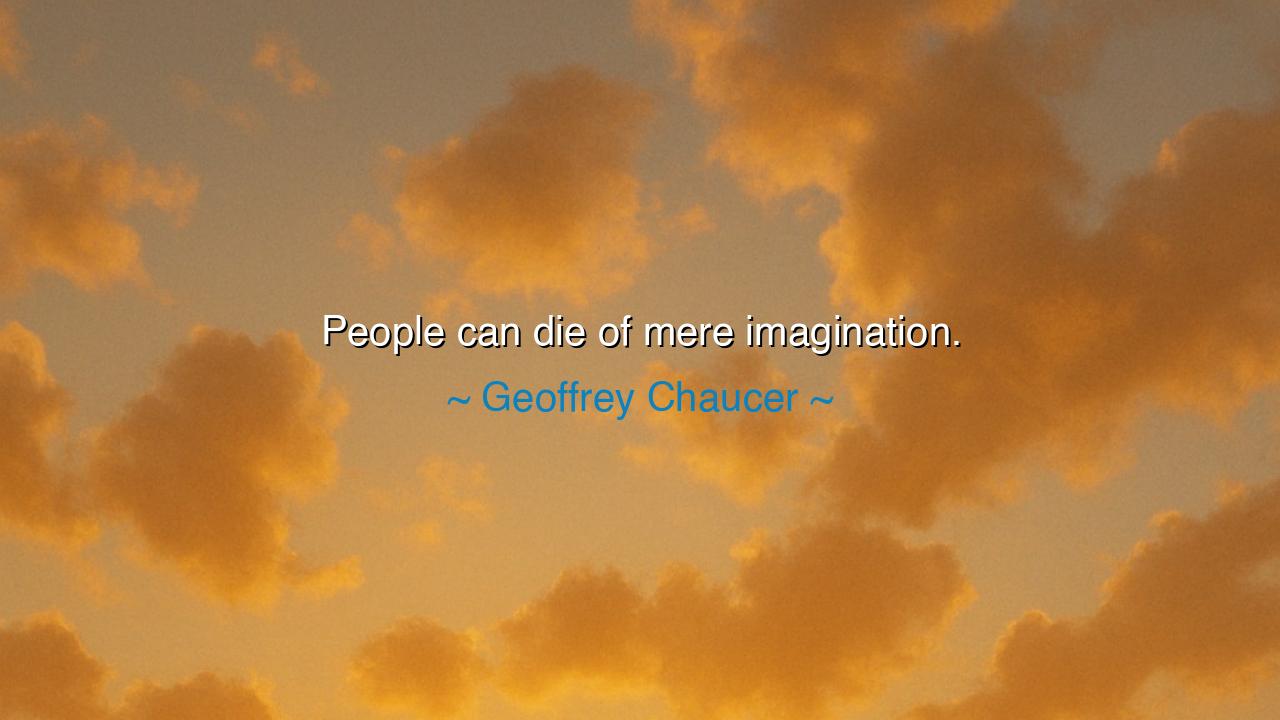
People can die of mere imagination.






“People can die of mere imagination.” So wrote Geoffrey Chaucer, the father of English poetry, whose pen wove the humor and sorrow of the human condition. Though spoken in jest within the Canterbury Tales, his words shimmer with a deeper truth—one as ancient and perilous as the human heart itself. For in this saying, Chaucer does not mock the power of imagination, but warns of its dominion. What the mind believes, the body obeys; what the spirit fears, it may summon into being. Imagination, that divine gift which can create worlds of beauty and art, can also conjure specters of despair strong enough to undo the very life it inhabits.
The ancients understood this mystery well. They said that thought is the architect of being, that the soul shapes the flesh. In their temples, they taught that man’s inner world is not illusion but creation itself. To imagine deeply is to bring forth energy, to mold the invisible into the real. And so, when Chaucer speaks of dying from imagination, he speaks not of fanciful dreams, but of belief so powerful that it alters the body, belief that consumes the heart as surely as fire devours the reed. Thus, imagination is no harmless plaything—it is the forge of fate, where joy or ruin may be hammered into form.
There are tales from every age of men and women who have perished by thought alone. Consider the physicians who have recorded the strange death of those under the curse of belief—the man who, convinced he had been poisoned, withered away though his body held no toxin; the prisoner who froze to death in a warm cell because he believed cold air had entered through unseen cracks. The mind, in its infinite strength, can slay or save. To die of imagination is not to die of madness—it is to die of belief ungoverned, of the shadows that reason failed to calm.
Yet do not think Chaucer’s words only tragic, for they contain also a mirror of power. If the imagination can destroy, it can also heal. The same force that leads to ruin can lift the soul toward rebirth. The warrior who believes he will triumph gathers strength beyond measure. The sick who envision recovery stir the body’s hidden will to live. Even in modern times, healers have witnessed the mystery of faith’s imagination—how hope, conviction, and vivid belief awaken the body’s forgotten light. Thus, imagination is neither curse nor blessing; it is a sacred fire, whose use determines its worth.
O children of the world, take heed: what you imagine, you become. Guard your thoughts as you would guard your life, for they are seeds that grow unseen. If you dwell long upon despair, it will bloom in you as sickness. If you feed upon fear, your heart will grow heavy with it. But if you turn your imagination toward love, beauty, and purpose, you will draw such things into being as surely as dawn follows night. You are not the prisoner of your thoughts—you are their master, if only you awaken to their power.
Remember, the imagination is a double-edged blade. The poet wields it to carve beauty from the void; the fearful man wields it against himself, and bleeds from wounds of his own making. Chaucer’s wisdom lies in the warning that no illusion is harmless, no fantasy without consequence. The stories we tell ourselves in silence shape the very blood that flows through our veins. Therefore, weave your inner tales with care; let your private visions be noble, for they will one day stand before you in flesh and circumstance.
And so, my listener, learn this final truth: life and death both dwell in the realm of imagination. You cannot escape its power—but you can choose its direction. Feed your mind with courage, your heart with wonder, your spirit with faith. When darkness whispers doom, imagine the dawn. When grief grips your soul, imagine healing, and it shall begin. For though people can die of mere imagination, they may also live forever by it, if they dare to imagine not fear, but light.






AAdministratorAdministrator
Welcome, honored guests. Please leave a comment, we will respond soon